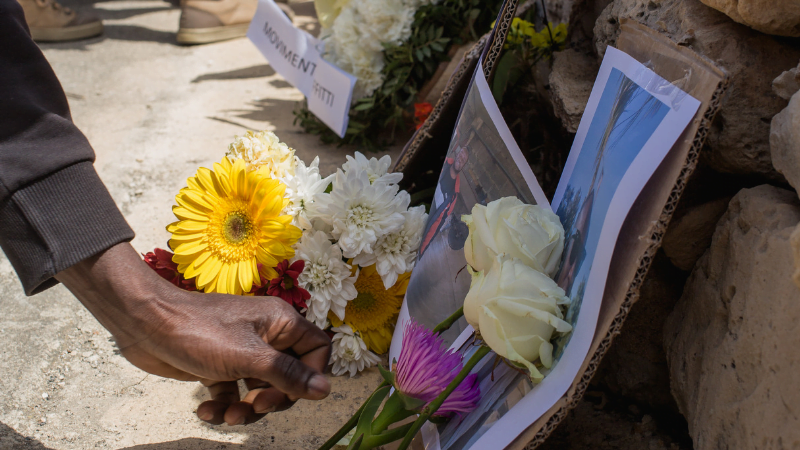The sun stung our necks last Saturday as we bowed our heads for a minute of silence at Lassana’s memorial in Hal Far. Activists, citizens, politicians and religious leaders came together to lay flowers and stand in silence on Triq Tal-Ġebel, where Lassana was murdered and other migrants attacked.
Speeches were brief. The presence of key figures advocating for the migrant communities was more important. Father Mark Cachia, Reverend Kim Hurst, Maria Pisani, and Ivorian community leader Ousmane Dicko, stood tall against a backdrop of fields and photos of Lassana. It sent a message that was as clear as the morning.
As columnist Ranier Fsadni recently wrote, the site of a murder or assassination is “a site of civic desecration. It needs reconsecration. That’s the reason why places struck by disaster are visited by Heads of State. It’s not just an act of solidarity. It’s a secular sacrament of the State’s comforting presence. Order drives out disorder”.
The previous day, 68 NGOs had expressed their “condemnation of racism and acts of wanton hatred” in a statement calling “upon the Maltese authorities to ensure that all members of Maltese society feel respected, safe and protected”.
PN leader Adrian Delia was also busy campaigning that day in Ta’ Xbiex, grooming Malta’s fear of foreigners. As a prop, a billboard read: “We’ve made a mistake: We’ve stuffed Malta with foreigners” (Ħadna żball: Fqajna Malta bil-barranin)
His speeches have referred to “clans” of “low quality” foreigners in Malta that are scaring Maltese children into not leaving their home. These foreigners, he continued, are making Maltese society poorer, rather than richer.
He also lambasted the government for its dependence on il-barranin to solve economic problems, and for the slave-like conditions in which they are kept. That is, rightly, an issue that is in the hands of the government to solve. ‘Foreigners’ are not subjects to help our economy; they are human beings with rights too.
Two days before Christmas, Malta refused entry to over 300 people, including pregnant women, children and babies, stranded at sea. It was one of several such episodes, because when it comes to saving people at sea, Malta is too small, too poor and under resourced, even though we are the ‘best in the Europe’ in Malta’s new version of Dubai.
Muscat, who started off his stint as Prime Minister trying to enforce a push back of asylum seekers only to be stopped by NGOs, now says the Opposition has a confused narrative on migrants. And both political parties claim they are not populist.
“To remember is not just about those who are no longer with us… but also about those who are still here. The living,” Cachia said to the crowd that gathered on Saturday.
For a portion of the living, the migrant communities, hatred and abuse are a normal part of everyday. And for many of us offering services to these communities, feeling helpless in the fight against such violence is also becoming normal.
Hate speech and hate crime towards asylum seekers and migrants is “pervasive” and “grave” across the EU, according to a report by The European Agency for Human Rights. The Agency said the issue was rendered “invisible” by the serious lack of data, due to under reporting.
In Malta, SOS are deeply engaged in tackling the issue of discrimination in their #StopHate campaign. Alex Hili, the campaign manager, said migrants are the second greatest targets of hate crime in Malta.
He handed me a simplified template for reporting, created to make the process more accessible. While it is possible to submit these reports anonymously, this rules out the option of prosecution.
The obvious fear contributing to anonymous reports is the fear of retaliation. The police? Limited resources and a lack of understanding of how to deal with hate crime makes things difficult, Hili said. But that’s changing, he continued, because the police are currently implementing international guidelines on how to deal with hate crime in their training (we heard this about domestic violence a decade ago, and look where that got us).
And the final question that mattered to me most: Can we guarantee that an asylum application will not be affected negatively if an asylum seeker decides to prosecute? “It shouldn’t,” he said.
The UNHCR also said, “asylum seekers are entitled to the same civil rights of any person present on the Maltese territory. This includes reporting to the police violations of their fundamental rights, such as the right to non-discrimination.”
If asylum seekers have a reasonable suspicion that their asylum application has been influenced by a report on rights’ violations, they have the right to request a representative of the UNHCR to accompany them at the appeal.
But for a vulnerable person with language barriers, seeking some form of justice is an extremely convoluted and risky process. And in a country where corruption is rampant, the Maltese know better than anyone else that without the right friends the courts can be a very hostile place.
“Peace isn’t kept; it’s made,” Hurst said to the crowd at Lassana’s memorial. And, indeed, peace continues to be broken for our migrant communities, where the system fails them over and over again.












